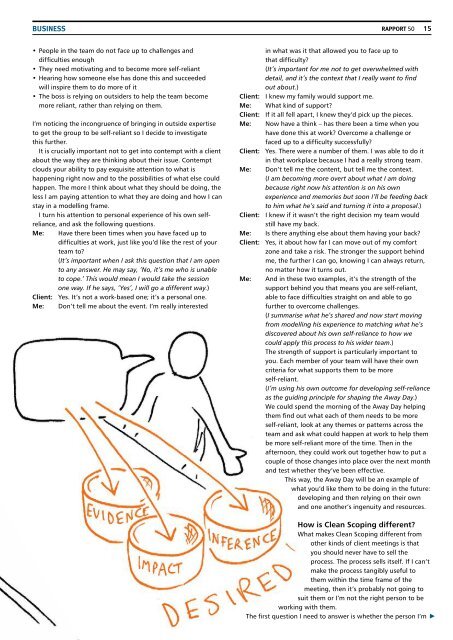Rapport
1UX3XUb
1UX3XUb
You also want an ePaper? Increase the reach of your titles
YUMPU automatically turns print PDFs into web optimized ePapers that Google loves.
usiness<br />
RApport 50 15<br />
• People in the team do not face up to challenges and<br />
difficulties enough<br />
• They need motivating and to become more self-reliant<br />
• Hearing how someone else has done this and succeeded<br />
will inspire them to do more of it<br />
• The boss is relying on outsiders to help the team become<br />
more reliant, rather than relying on them.<br />
I’m noticing the incongruence of bringing in outside expertise<br />
to get the group to be self-reliant so I decide to investigate<br />
this further.<br />
It is crucially important not to get into contempt with a client<br />
about the way they are thinking about their issue. Contempt<br />
clouds your ability to pay exquisite attention to what is<br />
happening right now and to the possibilities of what else could<br />
happen. The more I think about what they should be doing, the<br />
less I am paying attention to what they are doing and how I can<br />
stay in a modelling frame.<br />
I turn his attention to personal experience of his own selfreliance,<br />
and ask the following questions.<br />
Me: Have there been times when you have faced up to<br />
difficulties at work, just like you’d like the rest of your<br />
team to?<br />
(It’s important when I ask this question that I am open<br />
to any answer. He may say, ‘No, it’s me who is unable<br />
to cope.’ This would mean I would take the session<br />
one way. If he says, ‘Yes’, I will go a different way.)<br />
Client: Yes. It’s not a work-based one; it’s a personal one.<br />
Me: Don’t tell me about the event. I’m really interested<br />
in what was it that allowed you to face up to<br />
that difficulty?<br />
(It’s important for me not to get overwhelmed with<br />
detail, and it’s the context that I really want to find<br />
out about.)<br />
Client: I knew my family would support me.<br />
Me: What kind of support?<br />
Client: If it all fell apart, I knew they’d pick up the pieces.<br />
Me: Now have a think – has there been a time when you<br />
have done this at work? Overcome a challenge or<br />
faced up to a difficulty successfully?<br />
Client: Yes. There were a number of them. I was able to do it<br />
in that workplace because I had a really strong team.<br />
Me: Don’t tell me the content, but tell me the context.<br />
(I am becoming more overt about what I am doing<br />
because right now his attention is on his own<br />
experience and memories but soon I’ll be feeding back<br />
to him what he’s said and turning it into a proposal.)<br />
Client: I knew if it wasn’t the right decision my team would<br />
still have my back.<br />
Me: Is there anything else about them having your back?<br />
Client: Yes, it about how far I can move out of my comfort<br />
zone and take a risk. The stronger the support behind<br />
me, the further I can go, knowing I can always return,<br />
no matter how it turns out.<br />
Me: And in these two examples, it’s the strength of the<br />
support behind you that means you are self-reliant,<br />
able to face difficulties straight on and able to go<br />
further to overcome challenges.<br />
(I summarise what he’s shared and now start moving<br />
from modelling his experience to matching what he’s<br />
discovered about his own self-reliance to how we<br />
could apply this process to his wider team.)<br />
The strength of support is particularly important to<br />
you. Each member of your team will have their own<br />
criteria for what supports them to be more<br />
self-reliant.<br />
(I’m using his own outcome for developing self-reliance<br />
as the guiding principle for shaping the Away Day.)<br />
We could spend the morning of the Away Day helping<br />
them find out what each of them needs to be more<br />
self-reliant, look at any themes or patterns across the<br />
team and ask what could happen at work to help them<br />
be more self-reliant more of the time. Then in the<br />
afternoon, they could work out together how to put a<br />
couple of those changes into place over the next month<br />
and test whether they’ve been effective.<br />
This way, the Away Day will be an example of<br />
what you’d like them to be doing in the future:<br />
developing and then relying on their own<br />
and one another’s ingenuity and resources.<br />
How is Clean Scoping different?<br />
What makes Clean Scoping different from<br />
other kinds of client meetings is that<br />
you should never have to sell the<br />
process. The process sells itself. If I can’t<br />
make the process tangibly useful to<br />
them within the time frame of the<br />
meeting, then it’s probably not going to<br />
suit them or I’m not the right person to be<br />
working with them.<br />
The first question I need to answer is whether the person I’m


